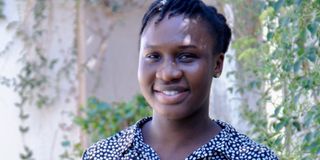Prime
Will national action plan be sigh of relief for persons with albinism?

Author, Joy Anyait. PHOTO/FILE/COURTESY
What you need to know:
- The US National Institute of Health (NIH) estimates that Africa has between one in 5,000 and one in 15,000 inhabitants living with albinism.
Persons with albinism have long-grieved over trauma, torture, violence and discrimination meted at them due to their genetic anomaly. Alarmingly, different global societies unfortunately still disdain the persons whose physical appearance is largely conditioned by lack of melanin, according to health experts. To understand it better, albinism occurs when due to gene mutations that affect the amount of melanin one’s body produces.
In 2019, Hormisdallen Primary, a renowned school in the country was sued over discrimination against an 11-year-old pupil. The youngster’s parent, Tulis Ayebare, accused the learning institution of unjustifiably denying her child boarding education but instead- citing the latter’s amelanistic appearance. Subsequent media engagements reveal that Ms Ayebare was intent on improving her daughter’s general performance in school but was denied the opportunity after her daughter was barred by school authorities from accessing boarding education.
Luckily, the Executive Director of a local NGO in Kampala, Albinism Umbrella, with the permission of Ayebare took matters up-front and the school had to compensate the duo of complainants. Such situations are an island of mistreatment that leaves a dirty mark on the reputation and esteem of persons living with albinism in the contemporary era.
It is a known fact that people with disabilities namely, including the persons with albinism who have most recently been legally recognized in that category under the Persons with Disabilities Act, 2020 have been deprived because many are neglected and disowned by even their own parents who perceive them as a calamity in society. This translates into their deeper exclusion from social life.
Already troubled with visual challenges and endless stigma, several of these vulnerable people living with albinism have been helplessly forced out of schools on the African continental bloc of more than 1.3 billion people. Going beyond Uganda, different countries extend ruthless barbaric practices at the albinos, including r. In fact, Malawi recently jailed three men aged 44, 45 and 75 to 155 years in prison after confessing to murdering a 23-year-old person with Albinism in May, 2022.
The US National Institute of Health (NIH) estimates that Africa has between one in 5,000 and one in 15,000 inhabitants living with albinism.
According to the Albinism World Wide Report 2021, miners use the bones of persons with albinism as amulets or bury them where they are drilling for gold with superstitious myths of fortune and power, and that fishermen weave the hair of persons with albinism into their nets as a ritual to improve their catches.
For a health condition that affects one’s eyes, hair and skin, Oculocutaneous albinism is the most common type in Africa it sometimes surfaces with bleeding problems.
Now, need for breaking the myths around people with albinism explains why the Ugandan government June 13 launched The National Action Plan for Persons with Albinism. The launch, falling on the same day the world marked the International Albinism Awareness Day is aimed at eliminating human rights violations and abuses of all Persons with Albinism anywhere in Uganda; or even elsewhere.
According to the National Action Plan for Persons with Albinisms, those born with the disorder will be able to access adequate healthcare, all levels of education, work and employment for children with albinism, women with albinism, refugees with albinism, addressing policies and laws, accountability, safety and security of Persons with Albinism. This in the broadest sense, if appropriately implemented, shall be a sigh of relief for our beloved brothers and sisters with albinism.
Joy Anyait is a public relations officer.




